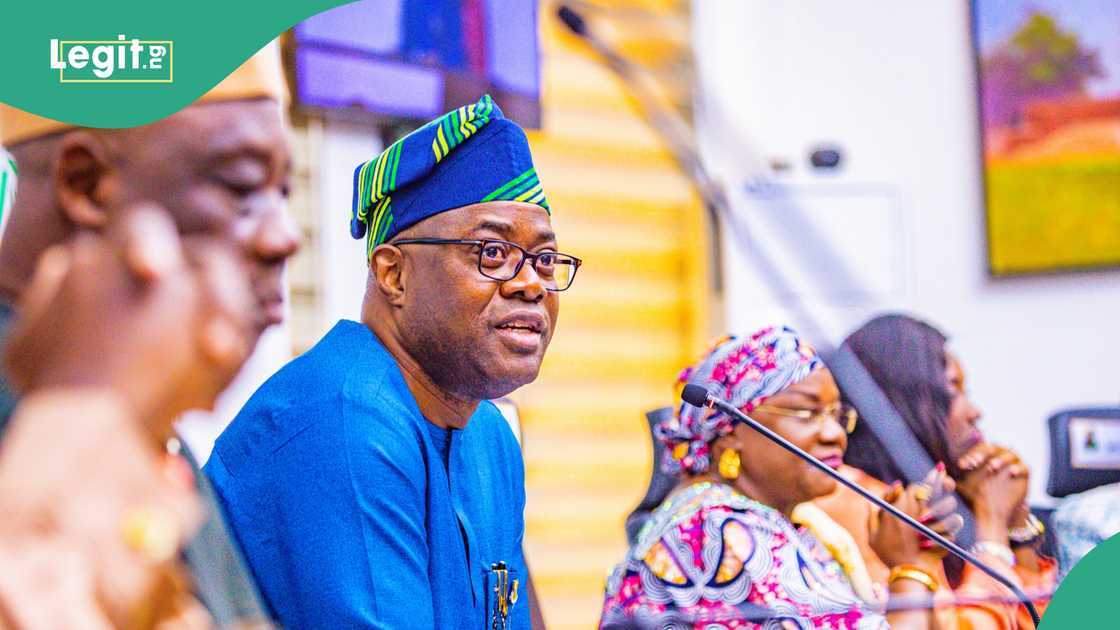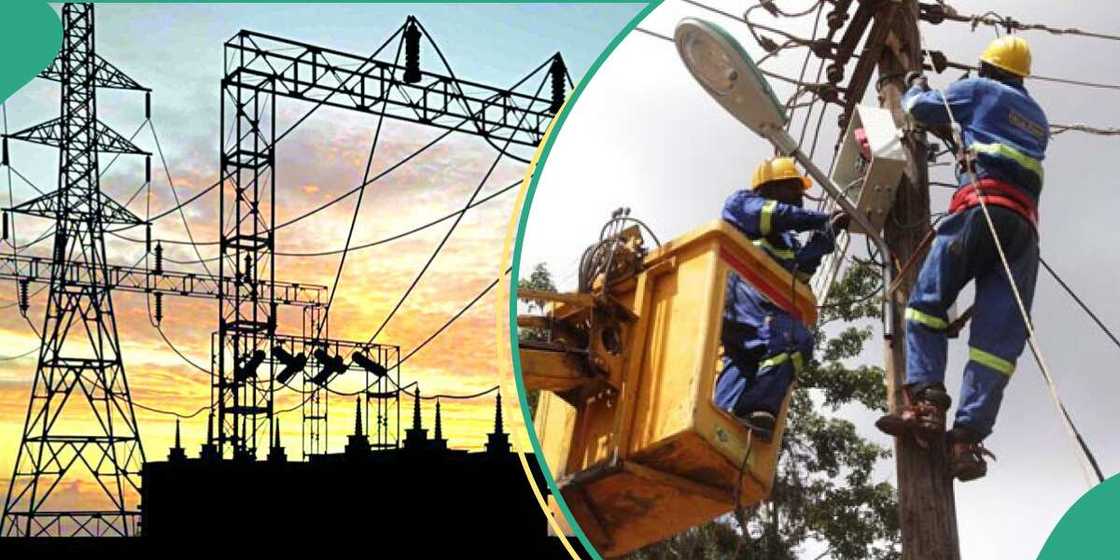'Double Wahala': Oyo Residents Groan as Infrastructure Deficit Persists in Ibadan Communities
- Residents of Ajibode, Laniba, Lakoto, and nearby communities have raised alarm over the deteriorating state of their roads and lack of electricity
- Small business owners, academics, and motorists described the daily hardships caused by poor infrastructure
- While some community leaders remain hopeful that the Oyo State Government will soon intervene, others have begun self-help efforts or relocated entirely
The residents of Ajibode, Lakoto Osajin, Laniba Mosoke, and the surrounding areas have decried the deplorable condition of the Ajibode-Lakoto and Ajibode-Laniba roads, which connect them to the township road and Nigeria’s premier University of Ibadan.
Speaking with Legit.ng correspondent in Ibadan, residents, including small business owners and academics, expressed concerns over the dwindling of their economic power.

Source: Facebook
Those who spoke with our correspondent disclosed that the condition of roads and electricity has become worse just as they complained of years of neglect.
For the people of Ajibode, Laniba, Lakoto, Osajin, Apete, and the surrounding areas, their residency or citizenship is a mistake of a kind.
Stakeholders expressed optimism
Despite the complaints by the residents, some stakeholders still expressed optimism that the Oyo State Government is trying and that it will be their turn to benefit from infrastructural development.
Mr Sina Awolola, who is the Chairman of Landlords and Landladies Association, Lakoto Zone 1, Unity Quarters Lakoto Apete said what people of Ajibode-Lakoto-Osajin and surrounding areas are facing is not peculiar to them.
“What our people are facing currently is not peculiar to them. What I think the Government is concentrating on now is Trunk A roads. Maybe by next year or by the middle of this year, they will start fixing that (Ajibode) road too, when the local governments are given their full autonomy. But we are not alone in this.
With respect to electricity, which is almost non-existent in the area, Mr Awolola believed that the situation is linked to the absence of industries.

Read also
Anambra 2025: Prominent politician opens up amid reports he is working against Soludo's re-election
She said:
“There is no tangible industries around this area. That is why, anywhere there is no industry, you hardly find them on Band-A. It is only Ban-A that gets a regular power supply. Due to that, they are charged a high price per kilowatt.
Our people cannot afford to pay for Band A
We are on Band E here and it is around 35/unit. You can see the difference. There is nobody, or maybe 10% of the people can afford to pay for Band A. That is just the problem.
Asking if people should not be complaining about the poor power supply, Mr Awolola opined that people can complain but should not be violent about it.
Violence against the IBEDC officials
The Chairman of Lakoto Zone 1 recalled that some unknown residents went to beat the officials of the Ibadan Electricity Distribution Company (IBEDC) at Osajin leading to the closure of their office in the area.

Source: UGC
“We have been complaining and complaining. In fact, our case is going to Olubadan's place because some boys went to beat up the IBEDC officials (because of lack of power supply). The company insisted that we should go and settle the matter at the Olubadan’s Palace
“They said unless there is a meeting that will guarantee the safety of their staff, they will not open their office in our community.
Residents shared traumatising experience
Some residents who spoke with Legit.ng said that in nearly a decade, the Ajibode-UI road has continued to deteriorate, causing harm to the well-being of the residents, while the lack of electricity has impacted the economy negatively.
A resident of Ajibode, Mr Akeem Azeez, expressed frustration and psychological trauma due to the poor electricity and bad roads.
Mr Azeez said:
“The bad roads and poor electricity supply have affected the residents in many instances.
“It is responsible for the high cost of transportation in the area. The bad roads are so bad that they are prone to accidents”
“It is traumatising for one that when one goes out and while returning home, thinks of how bad the roads are no hope of basic things such as electricity. One develops a psychological issue because of this.
“The respondent noted that “many personal vehicle owners have abandoned their vehicles at home.”
Residents of circumstance
Speaking with Legit.ng, a Professor of Agricultural Extension and Rural Development at the University of Ibadan, Taofeeq Yekinni, who is a resident of the area, lamented the impact the bad roads have on the vehicles.
“As for the road, it’s very bad and people have to make do with it and bear the consequences on their vehicles and their transportation activities.
“The area is not good at all and that has resulted in several additional costs because we usually don’t go to that area except if you’re willing to pay more:
Regarding electricity supply, Prof Yekinni disclosed that “it’s also very bad. We feel very lucky if we have it for like 4 hours in two weeks.
Professor Yekinni is one of many University of Ibadan lecturers who reside in Ajibode, whose works and research activities require stable electricity and access road, but found both lacking.
He told Legit.ng that although the residents are resilient in helping themselves since the government is yet to come to their aid.
“The communities around had to gather money a number of times to buy granite and stones to repair the road many times. Well, people have resorted to various ways to manage the situation.”
According to him, some have relocated from the locality when they couldn’t bear it anymore. Those who could afford solar or an inverter are also doing that.
Business owners, motorists expressed stress, worries
Speaking on the state of the roads, the small business owners in the area lamented environmental hazards, especially for those who have their businesses/shops along the road, as a result of dust that causes both health challenges to the people and contamination of the foodstuffs being displayed off the road.
A businesswoman who would not want to be named disclosed that:

Read also
Popular PDP governor breaks silence on rumoured defection to APC: “The future lies before me”
“We are tired of the dust that causes us catarrh and other health issues. Those selling food items beside the road need to take extra measures to protect their goods.
“Sometimes, we have to wet the road when it is dry. Also, when it rains, we are not spared from water from the potholes being splashed on us and our wares as motorists navigate the bad portions of the roads.
Meanwhile, a commercial tricyclist who shared his experience on the road narrated that “Now, it is the rainy season, the road will be messed up very soon, and the road will be a nightmare for the motorists. It is not easy.”
The Government to the rescue
Residents have continued to call on the Oyo State Government to be merciful to the communities
Although we had heard that the state government has been making efforts. I mean, he is promising to do something, especially during the last campaign election.
The governor was said to have listed the roads as part of what he would be doing, but then it’s not done, it has not been done, and nothing has been done so far.
Bodija explosion: 1 year after, victims decry neglect
Earlier, Legit.ng reported that residents of Dejo Oyelese Close in Bodija, Ibadan, were expressing frustration over what they describe as government abandonment following the devastating explosion that rocked the area in early 2024.
The disaster, which affected over 400 houses and claimed multiple lives, left many struggling to recover, with little to no assistance from authorities
Source: Legit.ng

Ibrahim Sofiyullaha (Editorial Assistant) Ibrahim Sofiyullaha is a graduate of First Technical University, Ibadan. He was the founder and pioneer Editor-in-Chief of a fast-rising campus journalism outfit at his university. Ibrahim is a coauthor of the book Julie, or Sylvia, written in collaboration with two prominent Western authors. He was ranked as the 9th best young writer in Africa by the International Sports Press Association. Ibrahim has contributed insightful articles for major platforms, including Sportskeeda in the UK and Motherly in the United States. Email: ibrahim.sofiyullaha@corp.legit.ng

Ridwan Kolawole (Oyo State Correspondent) Oyo state's regional correspondent Ridwan Kolawole has over a decade of journalism practice, covering politics, crimes/conflict, education, and social issues. For passion and knowledge mobilisation, Ridwan practices journalism and teaches it at the University of Ibadan.






